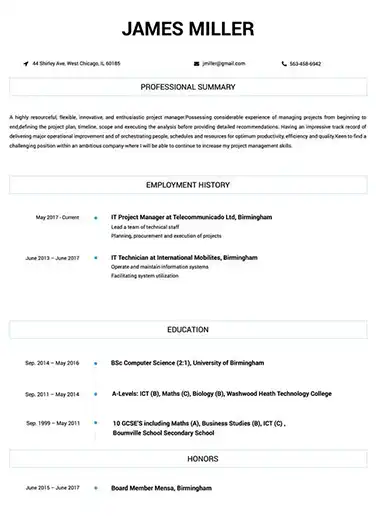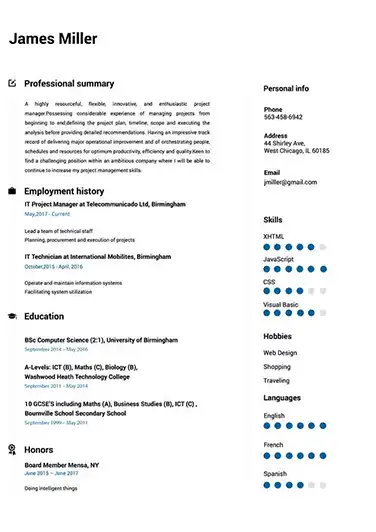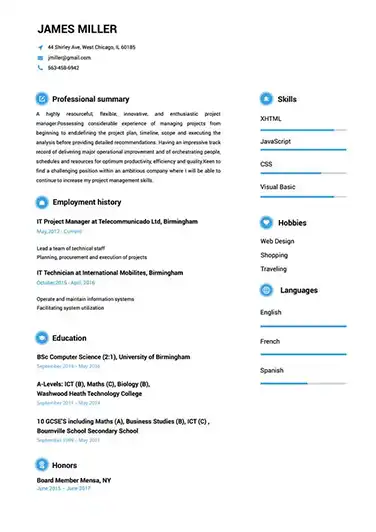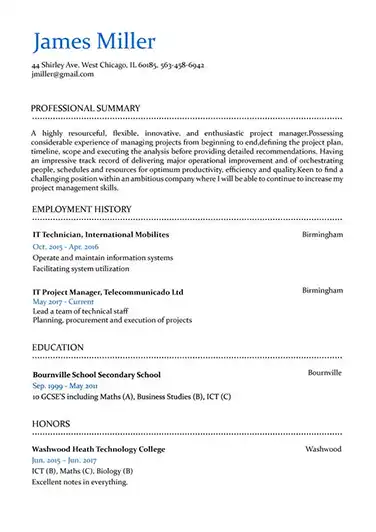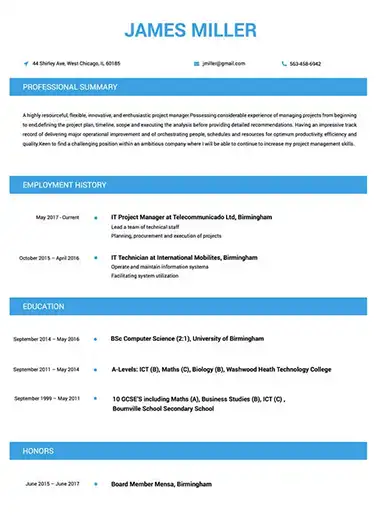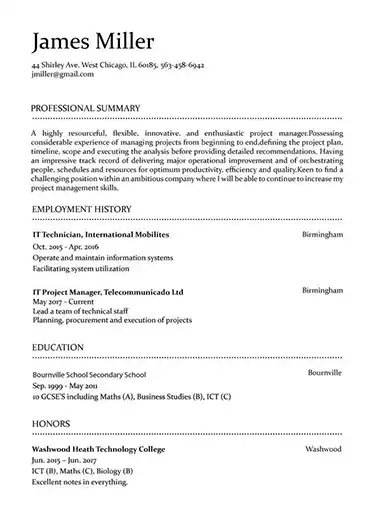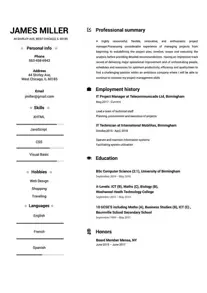 Use This Template
Use This Template
Build your resume in 15 minutes
Create an awesome resume that meets the expectations of potential employers with our selection of professional, field-tested resume templates.
recruiter: Resume Samples & Writing Guide
adams.zoe@protonmail.com
900-963-7710
Professional Summary
Employment history
- Develop and maintain a network of contacts to help identify and source qualified candidates
- Monitor industry trends and best practices in recruiting
- Develop and implement recruitment strategies
- Stay up-to-date on labor legislation and employment laws
- Conduct reference and background checks
- Participate in job fairs and other recruitment events
- Participate in professional organizations and conferences to stay current on recruitment trends
- Develop and maintain relationships with hiring managers to ensure a smooth recruitment process
- Conduct reference and background checks
Education
Skills
Do you already have a resume? Use our PDF converter and edit your resume.
markjones4@hotmail.com
864-347-3412
Employment history
- Create job postings and manage job boards
- Develop and maintain a network of contacts to help identify and source qualified candidates
- Negotiate job offers and coordinate onboarding
Education
Skills
jackson-leonard@hotmail.com
640-046-5979
Employment history
- Maintain and update applicant tracking systems
- Develop and implement recruitment strategies
- Stay up-to-date on labor legislation and employment laws
- Track and report recruiting metrics
- Negotiate job offers and coordinate onboarding
- Participate in job fairs and other recruitment events
- Maintain and update applicant tracking systems
- Stay up-to-date on labor legislation and employment laws
- Develop and maintain a network of contacts to help identify and source qualified candidates
Education
Skills
baileyvictor@protonmail.com
837-543-2677
Employment history
- Create job postings and manage job boards
- Maintain and update applicant tracking systems
- Develop and implement recruitment strategies
- Conduct reference and background checks
- Develop and implement recruitment strategies
- Negotiate job offers and coordinate onboarding
- Participate in job fairs and other recruitment events
- Source and recruit candidates using various recruiting tools, such as job boards, social media, and internet sourcing
- Maintain and update applicant tracking systems
Education
Skills
robinsonike46@aol.com
706-005-4389
Employment history
- Develop and implement recruitment strategies
- Track and report recruiting metrics
- Monitor industry trends and best practices in recruiting
- Monitor industry trends and best practices in recruiting
- Screen potential candidates, review resumes, and conduct interviews
- Develop and maintain relationships with hiring managers to ensure a smooth recruitment process
- Develop and maintain a network of contacts to help identify and source qualified candidates
- Stay up-to-date on labor legislation and employment laws
- Participate in professional organizations and conferences to stay current on recruitment trends
Education
Skills
Not in love with this template? Browse our full library of resume templates
There’s no getting around it, as a fellow recruiter your resume is going to be judged by a higher standard than most. You’ll be expected to get every detail right and show an absolute mastery of the job application process from both sides.
Of course that’s easier said than done. Despite those high expectations, your recruiter experience isn’t going to make crafting your recruiter resume that much easier. Fortunately, we’ve put together this guide to help. We’ll walk you through every step of the process with helpful tips and reminders to ensure you get all those critical details just right.
What this guide will show you:
- Top quality recruiter resume examples to get you started
- Tips for getting past ATS
- How to get your formatting just right
- The best way to include your education and certifications
- How to add impact to your hard and soft skills
- Techniques for highlighting your achievements
- What makes a resume objective or summary effective
- What to do if you have little or no experience as a recruiter
- How to use a resume builder for better results
Recruiter resume examples you can learn from
As a recruiter you’ve probably seen hundreds of resumes, so why are we starting this guide with some examples? Simply put, the typical examples you’re used to seeing are good benchmarks for the recruiter resume you need to create. With expectations high, you should start by taking inspiration from top quality examples.
Carefully look over the examples below and start listing what stands out about them. This initial list can allow you to start with a set of ideas instead of a blank page, making it easier to get started.
[Examples]
How to create a recruiter resume that will land the job
One of the biggest issues with resumes in general is that they don’t consider their audience. However, for a recruiter resume this is especially critical to avoid. If the way you craft your resume shows a lack of understanding or appreciation for the person reading it, you’ll be showing that you don’t have a firm grasp of being a recruiter.
So throughout the process of creating each resume (you are creating custom resumes for each position, right?), put yourself in the shoes of the recruiter who’ll be reading it. Consider what’s important to them, what will stand out, and what questions your resume might bring up. By using empathy and getting ahead of potential issues, you’ll give yourself a much better shot at landing the job.
However, as you know, the first hurdle your resume will need to overcome probably won’t be a fellow recruiter but an ATS.
What you need to know about ATS
As a recruiter, you’ve certainly heard about Applicant Tracking Systems (ATS) but even if you’ve used them in hiring, how much do you really know about how to get past them as an applicant? Considering how ubiquitous ATS are these days, you need to be thinking about them from the start, so here’s a quick refresher of all the things you need to do to ensure your resume is ATS-ready.
- Submit your resume as a .doc, .docx, or .pdf. This should go without saying but failing to do this almost guarantees your resume will be rejected by ATS so it’s worth repeating.
- Use a resume builder to ensure your file is easy to read by ATS. This gets more into the technical side of ATS that most recruiters aren’t familiar with. In essence, the structure of the data within a resume file has an enormous impact on how easy it is for ATS to read it. This means that a resume might be rejected simply because the ATS can’t read its contents well enough. To get around this, be sure to use a resume builder which is specifically designed to produce ATS-friendly files.
- Keyword-optimize for ATS. You may be familiar with the process of feeding an ATS the criteria for judging incoming resumes. But even if you’re not, you should be considering this process by taking keywords from the job description and incorporating them into your resume as closely as possible to how they were originally written. By doing this, you’re increasing the chances the ATS sees you as a qualified applicant and you make it through to a fellow recruiter.
How should you format your resume?
Once your resume makes it past ATS, you’ve got to make a strong first impression on that recruiter. One of the ways to do this is by being deliberate with your formatting. Even as an HR professional, it’s all too easy to simply start writing and adding resume sections without much thought. However, you need to always be thinking about the flow and order of information your resume conveys.
Start with the basics, you already know you should be using reverse chronological order but try going through the sections of your resume while putting yourself in the recruiter’s shoes. What questions arise? Where can you reorder information to get ahead of those questions? If possible, try sending your resume to a fellow HR professional to get their input.
Then we come to the ultimate formatting question: resume length. You already know that reviewing resumes can be tedious, so consider that fellow recruiter when deciding on the best length. Aim to have your resume as short and information dense as possible. After all, if you submit a 3 page resume, that recruiter would be fair to wonder whether you think other applicants should do the same. That question won’t make a good impression for you.
Which sections should your resume include?
While including all of these would likely make your resume too long, these are the main sections you should consider adding.
- Resume objective or summary
- Work experience
- Certifications
- Achievements
- Projects
- Education
- Hard skills
- Soft Skills
How to list your education or certifications on the resume
The education section is one of those places where resume experts and novices alike tend to go on autopilot. They put in their degrees, majors, GPA, etc. even though in many cases the information isn’t really necessary. Let’s review some examples to better illustrate this.
BA in English
University of Massachusetts at Amherst
2002-2006
-Honored with a department writing award
-President of the campus literature society
This is a marginal case but illustrates what not to do well. If your degree is unrelated to your recruiter work and especially if you graduated more than 10 years ago, it’s probably not worth mentioning. Or, if you do mention it, simply list that you have a degree to save valuable space for more impactful information.
The other details in this example could be relevant. Being a good writer and knowing how to manage people are valuable skills. However, work you did this far into the past while a college student is simply not the most professional and effective way to communicate that you have those skills.
BA in Psychology
University of Texas at Austin
2014-2018
-Worked in the admissions department from 2015-2018
This education example is worth including for a few key reasons. First, it’s quite recent. Next, the degree is more closely related to HR work. Lastly, the work in the university admissions department is similar enough to HR work to be worth including.
As for certifications, they are an underrated tool for concretely demonstrating skills, especially if your degrees were obtained a long time ago. If you want to show an HR department that you’re proactive about staying on top of the latest techniques, this is the way to do that. Not to mention the fact that those certification letters next to your name really add a professional touch. But which certifications are best for recruiters?
Courses and certifications to consider including
The world of recruiting has an enormous number of certifications and courses, meaning it’s easier than most to find one that works for you. Here’s a list of some of our top choices.
- LinkedIn Certified Professional Recruiter Course
- LinkedIn External Recruiter Course
- LinkedIn Technical Recruiter Course
- LinkedIn Corporate Recruiter Course
- LinkedIn Recruit and Maximize Talent Course
- AIRS Training in Veteran Recruitment
- AIRS Certified Diversity and Inclusion Recruiter (CDR)
- AIRS Elite Certified Recruitment Expert (ECRE) Certification
- AIRS Certified Social Media Recruiter (CSMR)
- AIRS Professional Recruiter Certification (PRC)
- AIRS Recruiter Academy Certification
- HRCI Professional in Human Resources® (PHR) Certification
- HRCI Associate Professional in Human Resources® (aPHR) Certification
- HRCI Senior Professional in Human Resources® (SPHR) Certification
- ATD Associate Professional in Talent Development
- ATD Certified Professional in Learning and Performance (CPLP)
- Recruiter.com Recruiting 101 Certification Program
- NAPS Certified Personnel Consultant (CPC) Certification
- SHRM Certified Professional (SHRM-CP)
- SHRM Senior Certified Professional (SHRM-SCP)
- TMI Talent Management Practitioner
- TMI Senior Talent Management Practitioner
- REI Recruiter Certification Program
- LHC Recruiter Academy Certified Recruiter Program
How to make your skills more effective
This advice may be obvious to you as a recruiter, but a surprising number of people in the field haven’t stopped to consider why some applicant skills seem more impactful and convincing. The difference is specifics and examples. Recruiters can see fluff a mile away, so you need to go beyond simply listing a bunch of skills and find ways to convincingly demonstrate that you have them. This is particularly important for soft skills.
Let’s go through some examples to see what that looks like in practice.
Organized
It’s a common skill required for recruiters for good reason. If you’re going to be managing dozens or hundreds of applications at a time, you need to be organized. But simply stating that you are doesn’t mean very much. Let’s try adding an example to emphasize the skill.
Organized
-Hired an average of 1.7 candidates per week out of 87 average applicants at HR Ventures
Giving an example of the workload you were able to manage makes this skill much more believable. In cases where you don’t have as much direct experience as a recruiter, these examples could be from non-HR work or even outside of your professional life altogether.
The best hard skills to list on a recruiter resume
- Talent acquisition
- LinkedIn recruiting
- HR tracking systems
- Specific ATS
- Social media networking
- Contact finders like Swordfish, Hunter.io, or Lusha
- Resume platforms like Indeed, or ZipRecruiter
- Data mining
- Candidate interviewing
- Taleo
The best hard skills to list on a recruiter resume
- Organized
- Attention to detail
- Written and oral communication
- Empathy and interpersonal skills
- Working well in groups
How to highlight your achievements
Recruiters tend to see inflated achievements every day. Your goal needs to be demonstrating that your achievements are real and worth noting. As with your skills, the best way to do that is by getting specific. But the devil is in the details, so let’s review some examples to see how the right framing and wording can enhance your achievements.
LinkedIn Recruiter
HR Systems Inc.
2014-2018
-Responsible for hiring qualified candidates for our clients
-Consistently met hiring quotas
-Mastered the process of recruiting and networking via LinkedIn
The achievements listed in this role fall flat because they focus on responsibilities and when they do highlight real achievements they’re too light on specifics. The first point about hiring candidates is too obvious to be worth mentioning. The second simply communicates that you weren’t terrible at your job relative to HR Systems’ standards (and whether those standards were high, who knows?) Lastly, this example makes a strong claim of mastery in some critical LinkedIn skills, but it would be helpful to have some LinkedIn Learning courses or data to back this claim up.
LinkedIn Recruiter
HR Systems Inc.
2014-2018
-Had to adapt and understand hiring systems and criteria for a variety of industries from the C-suite to designers
-Hired an average of 50 qualified candidates a month
-Obtained LinkedIn certifications for Corporate, Technical, and External recruiting
This version of that example refocuses the applicant’s achievements on their adaptability, ability to handle a large workload, and mastery of various aspects of LinkedIn recruiting. In other words, this version turns those experiences into concrete evidence of important skills.
Whether you’re listing your achievements under specific jobs or separately in their own section, it’s critical to think about these as tools for backing up your specific skills and not simply isolated things to boast about.
How to write a resume objective or summary and when to write which
The power of a resume objective or summary is that they each allow you to control the narrative of your resume. Instead of starting your resumes with something basic like your work history, you can begin by making a case for yourself, emphasizing key achievements, addressing the role you want, or getting ahead of a question the reader might have about something in your resume.
But you already know that first impressions are powerful, the trick is harnessing that power in the right way. The following examples will show you how to get the most out of a resume objective or summary.
Resume objective examples for recruiters
A resume objective should be concise and information dense while still being easy to read. You probably know how hard it is on your eyes to look over so many resumes, so do that other recruiter a favor by considering readability. But this is also your first impression, you’re elevator pitch for yourself as a candidate, so take the time to get it right.
Experienced and effective recruiter passionate about hiring talent capable of transforming organizations.
This candidate may have missed their calling to go into politics. A recruiter will be able to see right through this objective. It’s vague to the point of being meaningless. The first impression it creates is of someone who talks a lot but isn’t capable of really getting the job done.
Seasoned recruiter with 7 years as a headhunter currently exploring how non-LinkedIn social media platforms can be used to engage qualified C-suite candidates.
This example makes a choice not to focus as much on accomplishments (those can be easily listed elsewhere) but instead to use their resume objective to lay out how they’re at the cutting edge of their field. It works as a teaser text, something to make a recruiter sit up and want to learn more about the candidate and their approach. Not every objective should attempt this, but it’s an interesting example to show the versatility of this resume section.
Resume summary examples for recruiters
At its most basic level, a resume summary is just a longer objective. However, the worst mistake you can make is to take this as an excuse to ramble on. A summary should strive just as hard to be concise. Also be sure you have a good reason for choosing to include a resume summary. Even recruiters can get carried away and start adding information for its own sake, so always be sure to ask yourself “is this adding value to my resume?” If the answer is no, you need to delete that information. Let’s see what that looks like in practice.
Recent university graduate with a degree in psychology from the University of Arizona looking to begin a career in HR. Can bring internship experience from working as a food services manager and helping in hiring staff for 2 years. Also experienced in social media and LinkedIn networking.
The problem with this resume summary is that it focuses on conveying information that’s better conveyed elsewhere. The recruiter can look at your education, skills, and work history if they want to know more about what’s here. In other words, this example wastes valuable space simply restating basic information. Let’s see it rewritten in a more effective way.
Recent graduate looking to apply research in how episodic marketing can be used to improve recruitment through stronger brand identities to a recruiter position at Imagine Foods. Combines optimism and ambition with a practicality born from years working as a manager in the food service industry.
This example makes several subtle but important changes. First, it turns the disadvantage of not having much experience into an advantage by emphasizing the fresh and interesting ideas about recruitment that this candidate can provide. It also predicts the potential skeptical reaction of the reader and gets ahead of it by citing practical hiring experience. This makes it clear that this candidate doesn’t have their head in the clouds or some ivory tower.
How to write a recruiter resume when you have little or no experience
If you’re a recent graduate or moving from another part of HR, you need to demonstrate you have the core skills necessary for recruiting. Look back at the job description, list the skills and qualities they’re looking for, and ask yourself how you can demonstrate you possess them with achievements, certifications, and trainings. You can even take inspiration from the resume summary example above and frame that as an advantage.
Either way, you need to be upfront but not apologetic about your lack of experience. Just keep in mind that much of recruiting comes down to having the right attitude and mindset, things far harder to teach than using HR recruitment software. If you can show you’ve got those qualities, you’ll be in an excellent position to get hired even over a more experienced candidate.
How to make your resume stand out
As we mentioned in the beginning of this guide, expectations for a recruiter resume are sky high. Even getting all of the details discussed here right won’t guarantee you stand out. But one area where your competition is less likely to take the time is in the resume design.
Handing in a resume with beautiful modern design which makes the content easier and more pleasant to read is a cherry on top which shows you’ve gone the extra mile to make your resume a pleasure to read for a fellow recruiter. The best way to get that design is with a resume builder.
Why your recruiter resume needs a powerful resume builder
There’s no getting around the fact that basic black and white plain text resumes make it look like you didn’t put in the effort. The ability to easily choose from dozens of stunning modern designs is one of the main benefits of using a resume builder. But it also helps ensure your resume is ATS-friendly as well as making the process of creating many custom resumes for different positions simpler.
That’s why choosing Resumebuild.com’s intuitive and powerful builder is an easy choice. It lets you take care of important design and technical considerations so you can focus on the content. The result is a better recruiter resume and a better shot at that job you’ve been dreaming of.
recruiter Job Descriptions; Explained
If you're applying for an recruiter position, it's important to tailor your resume to the specific job requirements in order to differentiate yourself from other candidates. Including accurate and relevant information that directly aligns with the job description can greatly increase your chances of securing an interview with potential employers.
When crafting your resume, be sure to use action verbs and a clear, concise format to highlight your relevant skills and experience. Remember, the job description is your first opportunity to make an impression on recruiters, so pay close attention to the details and make sure you're presenting yourself in the best possible light.
recruiter/hr
- Recruiting (screening resumes, conducting interviews);
- Searching for candidates;
- Conducting telephone interviews to further explore skills, suitability for the position;
- Collecting, inputting and reporting recruitment data;
- Use social and professional networking sites for search candidates;
- Dealing with internal personal issues;
- HR management (adaptation, motivation, evaluation);
recruiter
- Broadcasted job announcements via public domain boardsforums, social media sites and industry specific search engines (hh.ru, job.ru, etc).
- Interviewed job applicants (online), reviewed qualification against position requirement.
- Submitted and scheduled client interviews for qualified candidates.
- Informed job applicants of details such as duties and responsibilities, compensation, benefits, schedules, working conditions, or promotion opportunities.
recruiter
- Responsible for executing the recruitment cycle for Non-IT professionals of Fortune 100 and Fortune 500 Clients in multiple locations across USA
- Identify, recruit, and screen potential candidates for these clients.
- manage job requirements for Non IT & Engineering domain.
- Extensive use of Job Posting Websites, portals and Direct Sourcing to recruit potential candidates.
- Sourcing Experience with Various Job boards like Monster, Career Builder, LinkedIn, Dice, Ladders and Indeed Etc.’
- Hands on Experience with ATS (Applicant tracking systems) like Bullhorn, Job Diva, E-recruit etc.
- Effectively involved in recruitment of candidates through Internet research, internal database, cold calling, referrals, networking, job postings, and other strategies.
recruiter/staffing coordinator/ admin assistant
- Coordinate the recruiting and staffing of nurses for client hospitals
- Handle the coordination and scheduling of 40 Area Hospital’s Staffing needs with over 70 available nursing employees
- Schedule and confirm staff placement for clients.
- Conduct searches to find needed childcare facilities.
recruiter
- Screen potential employees for available positions.
- Recruit experienced individuals to join our team.
- Conduct phone interviews with prospective employees.
- Conducting interviews for potential employees.
recruiter/hr Job Skills
For an recruiter/hr position, your job skills are a key factor in demonstrating your value to the company and showing recruiters that you're the ight fit for the role. It's important to be specific when highlighting your skills and ensure that they are directly aligned with the job requirements, as this can greatly improve your chances of being hired. By showcasing your relevant skills and experience, you can make a compelling case for why you're the best candidate for the job.
How to include technical skills in your resume:
Technical skills are a set of specialized abilities and knowledge required to perform a particular job
effectively. Some examples of technical skills are data analysis, project management, software proficiency,
and programming languages, to name a few.
Add the technical skills that will get hired in your career
field with our simple-to-use resume builder. Select your desired resume template, once you reach the skills
section of the builder, manually write in the skill or simply click on "Add more skills". This will
automatically generate the best skills for your career field, choose your skill level, and hit "Save &
Next."
- Data Entry
- Recruiting
- Recruitment Processes
- Human Resources Software
- Applicant Tracking Systems
- Employee Relations
- Onboarding
- HR Policies
- Payroll Administration
- Performance Management
- Job Descriptions
- Benefits Administration
- Employment Law
- Compensation
- Talent Acquisition
- Employee Engagement
- Workforce Planning
- HRIS Systems
- Diversity and Inclusion
- Interviewing.
How to include soft skills in your resume:
Soft skills are non-technical skills that relate to how you work and that can be used in any job. Including
soft skills such as time management, creative thinking, teamwork, and conflict resolution demonstrate your
problem-solving abilities and show that you navigate challenges and changes in the workplace
efficiently.
Add competitive soft skills to make your resume stand-out to recruiters! Simply select
your preferred resume template in the skills section, enter the skills manually or use the "Add more skills"
option. Our resume builder will generate the most relevant soft skills for your career path. Choose your
proficiency level for each skill, and then click "Save & Next" to proceed to the next section.
- Communication
- Interpersonal
- Leadership
- Time Management
- Problem Solving
- Decision Making
- Critical Thinking
- Creativity
- Adaptability
- Teamwork
- Organization
- Planning
- Public Speaking
- Negotiation
- Conflict Resolution
- Research
- Analytical
- Attention to Detail
- Self-Motivation
- Stress Management
- Collaboration
- Coaching
- Mentoring
- Listening
- Networking
- Strategic Thinking
- Negotiation
- Emotional Intelligence
- Adaptability
- Flexibility
- Reliability
- Professionalism
- Computer Literacy
- Technical
- Data Analysis
- Project Management
- Customer Service
- Presentation
- Written Communication
- Social Media
- Troubleshooting
- Quality Assurance
- Collaboration
- Supervisory
- Risk Management
- Database Management
- Training
- Innovation
- Documentation
- Accounting
- Financial Management
- Visualization
- Reporting
- Business Acumen
- Process Improvement
- Documentation
- Relationship Management.
How to Improve Your recruiter/hr Resume
Navigating resume pitfalls can mean the difference between landing an interview or not. Missing job descriptions or unexplained work history gaps can cause recruiters to hesitate. Let's not even talk about the impact of bad grammar, and forgetting your contact info could leave your potential employer hanging. Aim to be comprehensive, concise, and accurate.
harolddavis@protonmail.com
953-889-6922
Employment history
- Develop and maintain a network of contacts to help identify and source qualified candidates
- Monitor industry trends and best practices in recruiting
- Develop and implement recruitment strategies
- Develop and maintain relationships with hiring managers to ensure a smooth recruitment process
- Negotiate job offers and coordinate onboarding
- Participate in job fairs and other recruitment events
Education
Skills
Unexplained Year Gaps and Missing Job Experiences are a No-no
Gaps in your resume can prevent recruiters from hiring you if you don't explain them.
Key Insights- It's okay to have gaps in your work experience but always offer a valid explanation instead of just hiding it.
- Use the gap to talk about positive attributes or additional skills you've learned.
- Be honest and straightforward about the gap and explain it using a professional summary.
How to Optimize Your recruiter/hr Resume
Keep an eye out for these resume traps. Neglecting to detail your job roles or explain gaps in your career can lead to unnecessary doubts. Grammar blunders can reflect negatively on you, and without contact information, how can employers reach you? Be meticulous and complete.
Professional Summary
Employment history
- Develp and implemnt recrutment strtegies.
- Screan potential canditates, reviw resumess, and condct interveiws.
- Develp and maintaine a netwerk of contactes to help idenify and source qualifed candidtes.
- Trac and report recruting metrixs.
- Munitor industy trends and best practises in recruitin.
- Conducts reference an background checkss.
- Conduct refrence an background checkes.
- Deveop and maintan a netwok of contactes to help identifiy and souce quailified candiates.
- Crteae jbo postinsg annd mnaage job boards.
Education
Skills
Avoid Spelling Mistakes and Include your Contact Information
Missing contact information prevents recruiters from understanding you're the best fit for the position.
Key Insights- Make sure you're not missing contact information on your resume. That should include your full name, telephone number and email address.
- Make sure to use a professional email address as part of your contact information.
- Highlight your contact information and double check that everything is accurate to help recruiters get in touch with you.
recruiter/hr Cover Letter Example
A cover letter can be a valuable addition to your job application when applying for an recruiter/hr position. Cover letters provide a concise summary of your qualifications, skills, and experience, also it also gives you an opportunity to explain why you're the best fit for the job. Crafting a cover letter that showcases your relevant experience and enthusiasm for the Accounts Payable role can significantly improve your chances of securing an interview.
Adams adams.zoe@protonmail.com
900-963-7710
605 Riverbend Road, Midtown, TN
37748
Insperity
Kingwood, Texas
To the respected Insperity Hiring Team
As a Recruiter with a proven track record of success in Human Resources, I am excited to apply for the Senior Recruiter position at Insperity. I believe that my skills and expertise would make a valuable contribution to your team.
As someone who has always been committed to making a positive impact on the world, I have pursued opportunities to contribute to my community through my work wherever I may be. My experience in this field has equipped me with the skills and knowledge necessary to succeed throughout my life and I am confident that they will help me to bring my passion and expertise to your organization and help drive your success.
Thank you for considering my application for the Senior Recruiter role at your organization. I am dedicated to continuous improvement, and elated about the opportunity to join your team and work towards achieving our shared goals together.
Thank you for your time,
Zoe Adams
900-963-7710
adams.zoe@protonmail.com
Zoe Adams
Showcase your most significant accomplishments and qualifications with this cover
letter.
Personalize this cover letter in just few minutes with our user-friendly tool!
Related Resumes & Cover Letters
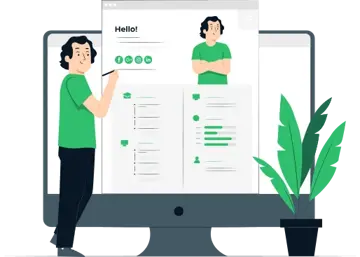
Build your Resume in 15 minutes
Create an awesome resume that meets the expectations of potential employers with our selection of professional, field-tested resume templates.

